Five Essential Elements for Great Audiobook Narration
Narration can make or break an audiobook. No matter how excellent the writing, how exciting the story, how deep the characters, if it's narrated poorly, it makes for a bad listening experience. Below are my top five requirements for great audiobook narration. What other elements do you look for in a satisfying audiobook?
Title links lead to places you can hear excerpts.
1. Authentic Gender Voicing
I tend to favor female narrators, and that has a lot to do with how they voice male characters. For some reason, many male narrators feel like the best way to make their voices sound feminine is to be breathy. Really, really breathy. Like they've just run several yards and could use a drink of water. Or like they're slightly aroused, even. This technique almost always makes the woman sound weak, like she might faint at any moment. I'm listening to Inferno by Dan Brown, and narrator Paul Michael falls into this trap, hard. Female narrators don't falter as much when voicing characters of the opposite sex. Usually a slight change in pitch is enough. Even if the character doesn't sound completely male, at least he sounds human and in full control of his faculties.
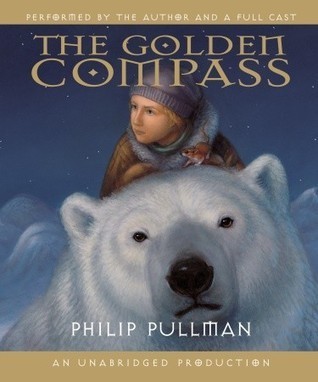
Example: Harry Potter and the Sorcerer's Stone by J. K. Rowling, narrated by Jim Dale
Jim Dale is one of the few male narrators who I think does justice to female voices. His female characters never sound weak unless they're written that way. I know people are divided with him, particularly on how he voices Hermione, but I love him. All of his characters in the Harry Potter series (and there are hundreds) sound distinct. His Luna is appropriately dreamy without becoming a caricature, and his McGonagall is fierce and a little old and quite stern and just overall wonderful.
2. Voice Variation
I don't need a fully-voiced audiobook, but I think some differentiation among character voices is essential, even if it's just a slight change in pitch or tone.
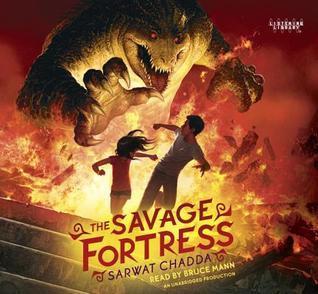 Example:
The Savage Fortress
by Sarwat Chadda, narrated by Bruce Mann
Example:
The Savage Fortress
by Sarwat Chadda, narrated by Bruce Mann
Mann wisely chooses not to completely transform his voice for the characters in Chadda's story. When he voices characters, it's clear it's still his own voice, but there's just enough differentiation between his normal narrating voice and the character to distinguish the character, to make her or him memorable and easily recognizable. I thought his voicing of the rakshasa Parvati was especially good - her voice has just a bit of a hiss to it, and he slows down his speech just a tad for her. My review
3. Authentic Accents
This one is pretty self-explanatory. A bad accent can completely ruin a book, particularly if it's used frequently. A good accent will pull you even further into the story, adding dimension to both character and setting. Accurate national as well as regional accents are important. People's ability to judge accuracy varies, but what's important is that it sounds right to the listener. (Although inaccurate stereotypes, even if they "sound fine" to the listener, should be avoided!)
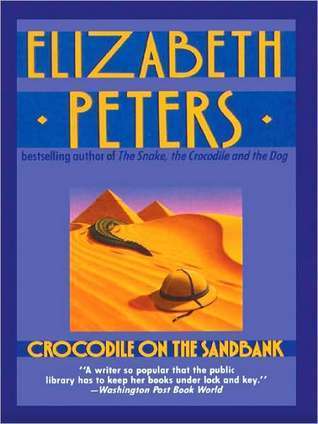
Example: Crocodile on the Sandbank by Elizabeth Peters, narrated by Barbara Rosenblat
Rosenblat juggles English, Arabic, and American accents in this series about female Egyptologist Amelia Peabody. Amelia is an Englishwoman who tells the story in first person, so it's mostly done in an English accent. Rosenblat does it so well that I did not know for years that she herself is an American, with a natural American accent.
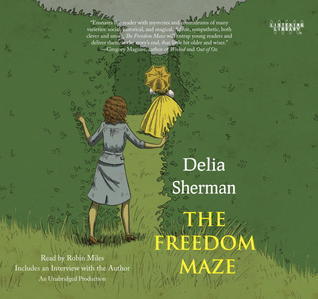 Honorable Mention:
The Freedom Maze
by Delia Sherman, narrated by Robin Miles
Honorable Mention:
The Freedom Maze
by Delia Sherman, narrated by Robin Miles
There's an interview at the end of the audiobook where Sherman mentions that she knew Miles was the right narrator for the job since she pronounced "Grandmama" the proper Southern way. Miles voices the entirely Southern cast (some black, some white) without stooping to stereotypical or exaggerated depictions. My review
4. Smooth Editing
All the pieces of the narration should fall together smoothly. There shouldn't be any irregular gaps in time between sentences or chapters. It should seem like the narrator recorded the whole story in one go, without pausing to eat a sandwich or visit the restroom or pick up the kids from school. There shouldn't be any static or strange background noise. An audiobook with poor editing will sometimes have sections that are louder than others (probably the issue I notice most frequently).

Example: The Golden Compass by Philip Pullman, narrated by the author and a full cast
It's much easier to come up with a non-example in this category, since good editing should be something you don't even notice. It's when the editing is bad that it stands out. That said, anything that incorporates as many different narrators as a Full Cast Audio production does and does it without a hitch deserves to be recognized. The Golden Compass is one of their best.
5. Narrator Enjoyment
This is more difficult to pin down. Narrator enjoyment of the story leads to natural, unforced changes in tone, pace,
pitch, volume, and so on. It makes the listening experience interesting
and fulfilling. It's obvious when a narrator isn't enjoying the story he's telling. There's no emotion behind his words, no oomph to the action scenes, no swoon during the kissing scenes, no cracked voices during the sad parts. I want a narrator who is so caught up in the story that she makes me caught up too. I want a narrator who makes me feel all the feelings, who can take a possibly mediocre story and turn it into something that makes you sob in the parking lot as you finish the last disc before heading in to do the shopping.
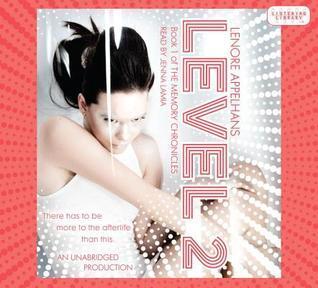 Example:
Level 2
by Lenore Appelhans, narrated by Jenna Lamia
Example:
Level 2
by Lenore Appelhans, narrated by Jenna Lamia
Lamia is known in the audiobook world for having a spot-on teenage girl voice. I was very impressed with her rendition of Level 2, a book that relies heavily on flashbacks. I don't generally enjoy flashbacks (actually I actively try to avoid them), but Lamia's narration, fraught with love and yearning and regret and all of those other delicious emotions, made me care intensely about them. I fully believed she was the voice of Felicia, and I fully believed she was just as hooked on the story as I was.







 Related StoriesThe Savage Fortress by Sarwat ChaddaAudiosynced: March EditionAudio Review: The Silence of Murder by Dandi Daley Mackall
Related StoriesThe Savage Fortress by Sarwat ChaddaAudiosynced: March EditionAudio Review: The Silence of Murder by Dandi Daley Mackall
Title links lead to places you can hear excerpts.
1. Authentic Gender Voicing
I tend to favor female narrators, and that has a lot to do with how they voice male characters. For some reason, many male narrators feel like the best way to make their voices sound feminine is to be breathy. Really, really breathy. Like they've just run several yards and could use a drink of water. Or like they're slightly aroused, even. This technique almost always makes the woman sound weak, like she might faint at any moment. I'm listening to Inferno by Dan Brown, and narrator Paul Michael falls into this trap, hard. Female narrators don't falter as much when voicing characters of the opposite sex. Usually a slight change in pitch is enough. Even if the character doesn't sound completely male, at least he sounds human and in full control of his faculties.

Example: Harry Potter and the Sorcerer's Stone by J. K. Rowling, narrated by Jim Dale
Jim Dale is one of the few male narrators who I think does justice to female voices. His female characters never sound weak unless they're written that way. I know people are divided with him, particularly on how he voices Hermione, but I love him. All of his characters in the Harry Potter series (and there are hundreds) sound distinct. His Luna is appropriately dreamy without becoming a caricature, and his McGonagall is fierce and a little old and quite stern and just overall wonderful.
2. Voice Variation
I don't need a fully-voiced audiobook, but I think some differentiation among character voices is essential, even if it's just a slight change in pitch or tone.
 Example:
The Savage Fortress
by Sarwat Chadda, narrated by Bruce Mann
Example:
The Savage Fortress
by Sarwat Chadda, narrated by Bruce MannMann wisely chooses not to completely transform his voice for the characters in Chadda's story. When he voices characters, it's clear it's still his own voice, but there's just enough differentiation between his normal narrating voice and the character to distinguish the character, to make her or him memorable and easily recognizable. I thought his voicing of the rakshasa Parvati was especially good - her voice has just a bit of a hiss to it, and he slows down his speech just a tad for her. My review
3. Authentic Accents
This one is pretty self-explanatory. A bad accent can completely ruin a book, particularly if it's used frequently. A good accent will pull you even further into the story, adding dimension to both character and setting. Accurate national as well as regional accents are important. People's ability to judge accuracy varies, but what's important is that it sounds right to the listener. (Although inaccurate stereotypes, even if they "sound fine" to the listener, should be avoided!)

Example: Crocodile on the Sandbank by Elizabeth Peters, narrated by Barbara Rosenblat
Rosenblat juggles English, Arabic, and American accents in this series about female Egyptologist Amelia Peabody. Amelia is an Englishwoman who tells the story in first person, so it's mostly done in an English accent. Rosenblat does it so well that I did not know for years that she herself is an American, with a natural American accent.
 Honorable Mention:
The Freedom Maze
by Delia Sherman, narrated by Robin Miles
Honorable Mention:
The Freedom Maze
by Delia Sherman, narrated by Robin MilesThere's an interview at the end of the audiobook where Sherman mentions that she knew Miles was the right narrator for the job since she pronounced "Grandmama" the proper Southern way. Miles voices the entirely Southern cast (some black, some white) without stooping to stereotypical or exaggerated depictions. My review
4. Smooth Editing
All the pieces of the narration should fall together smoothly. There shouldn't be any irregular gaps in time between sentences or chapters. It should seem like the narrator recorded the whole story in one go, without pausing to eat a sandwich or visit the restroom or pick up the kids from school. There shouldn't be any static or strange background noise. An audiobook with poor editing will sometimes have sections that are louder than others (probably the issue I notice most frequently).

Example: The Golden Compass by Philip Pullman, narrated by the author and a full cast
It's much easier to come up with a non-example in this category, since good editing should be something you don't even notice. It's when the editing is bad that it stands out. That said, anything that incorporates as many different narrators as a Full Cast Audio production does and does it without a hitch deserves to be recognized. The Golden Compass is one of their best.
5. Narrator Enjoyment
This is more difficult to pin down. Narrator enjoyment of the story leads to natural, unforced changes in tone, pace,
pitch, volume, and so on. It makes the listening experience interesting
and fulfilling. It's obvious when a narrator isn't enjoying the story he's telling. There's no emotion behind his words, no oomph to the action scenes, no swoon during the kissing scenes, no cracked voices during the sad parts. I want a narrator who is so caught up in the story that she makes me caught up too. I want a narrator who makes me feel all the feelings, who can take a possibly mediocre story and turn it into something that makes you sob in the parking lot as you finish the last disc before heading in to do the shopping.
 Example:
Level 2
by Lenore Appelhans, narrated by Jenna Lamia
Example:
Level 2
by Lenore Appelhans, narrated by Jenna LamiaLamia is known in the audiobook world for having a spot-on teenage girl voice. I was very impressed with her rendition of Level 2, a book that relies heavily on flashbacks. I don't generally enjoy flashbacks (actually I actively try to avoid them), but Lamia's narration, fraught with love and yearning and regret and all of those other delicious emotions, made me care intensely about them. I fully believed she was the voice of Felicia, and I fully believed she was just as hooked on the story as I was.







 Related StoriesThe Savage Fortress by Sarwat ChaddaAudiosynced: March EditionAudio Review: The Silence of Murder by Dandi Daley Mackall
Related StoriesThe Savage Fortress by Sarwat ChaddaAudiosynced: March EditionAudio Review: The Silence of Murder by Dandi Daley Mackall
Published on July 11, 2013 22:00
No comments have been added yet.



